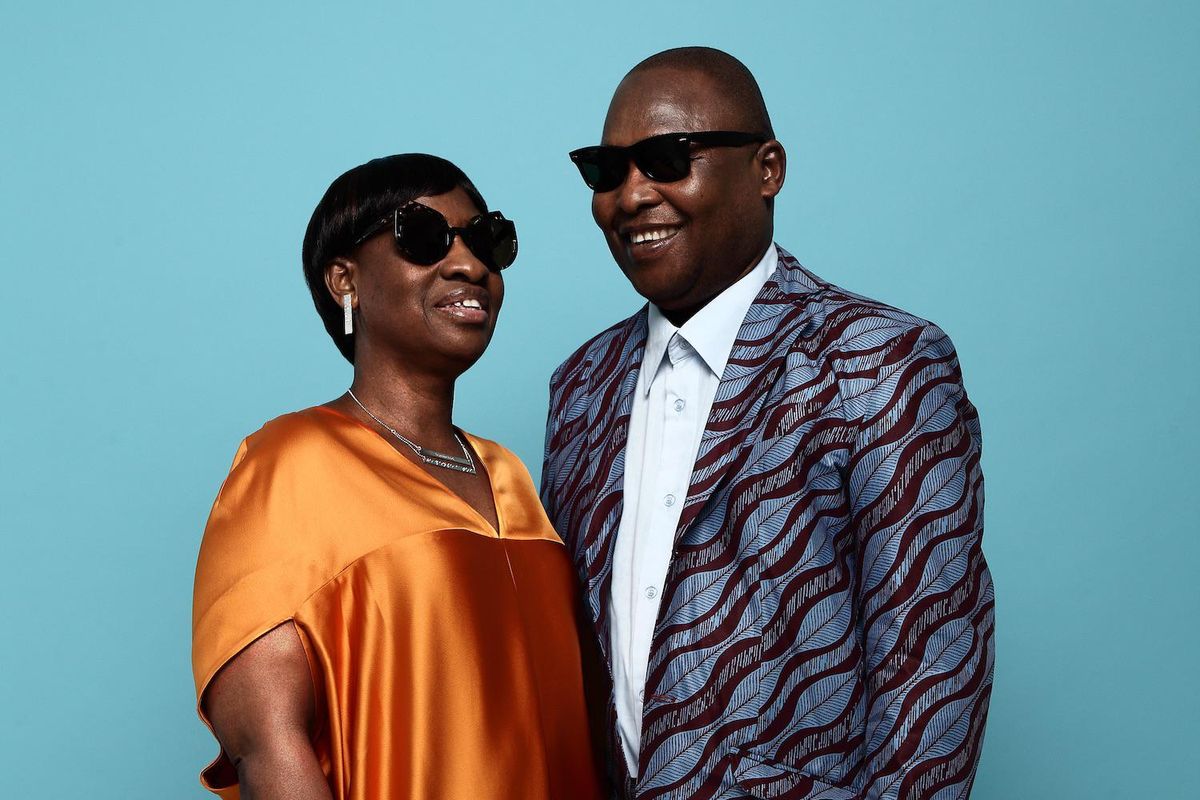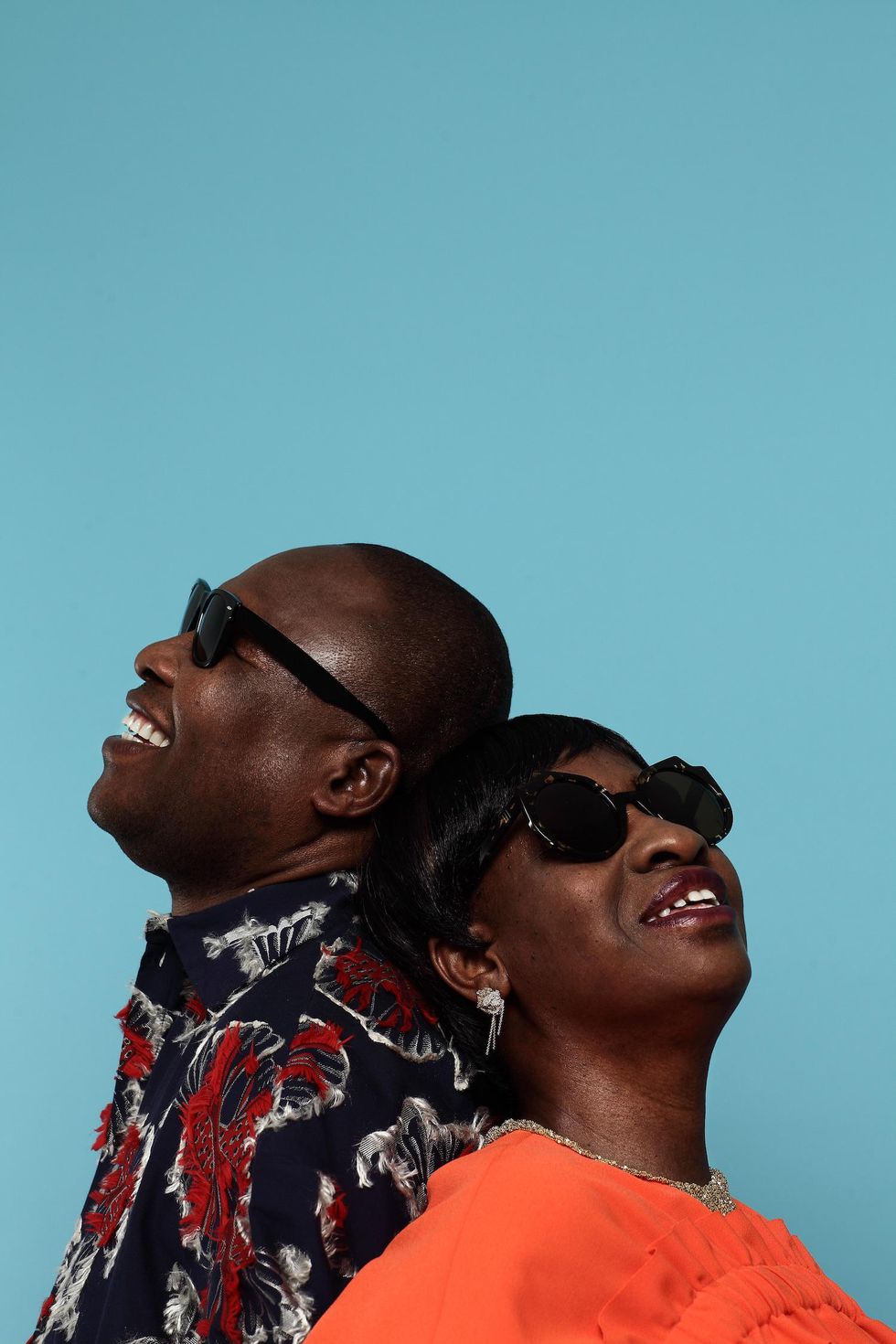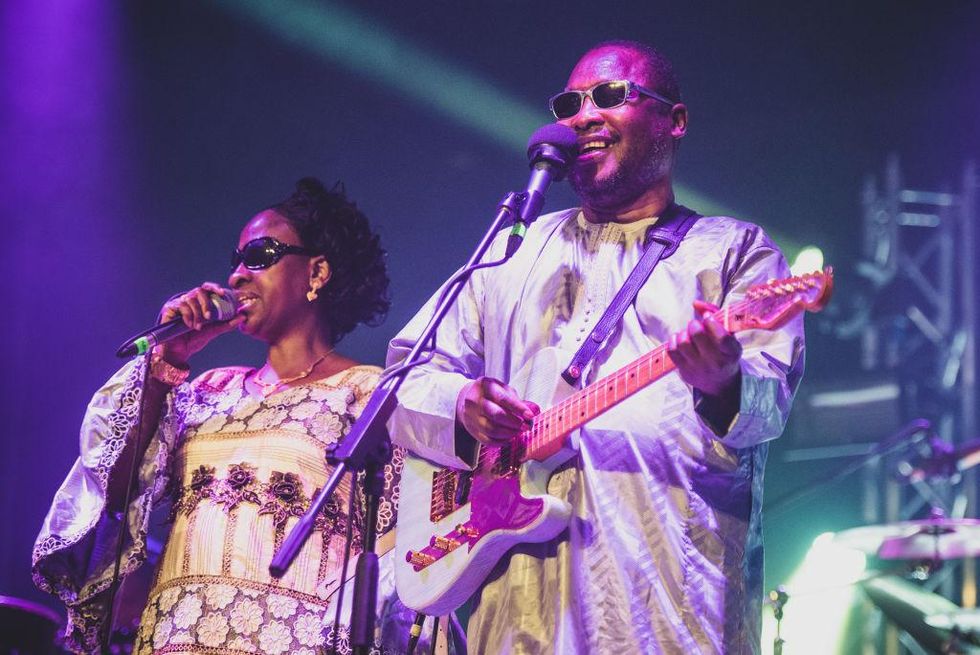Amadou & Mariam Forever
We talk to the legendary Malian duo about their rich past, songwriting process and their advice for young African artists with disabilities.

Amadou & Mariamdon't require an introduction.
The couple has been making Afro-blues music for over 35 years, drawing inspiration from their home of Mali, for over 35 years.
Their 1999 albumSou Ni Tilé sold 100,000 copies. In 2005, their album Dimanche à Bamako won the French Victoire de la Musique prize for Best World Music Album of the year and the BBC Radio 3 Award for Africa. It also went platinum in France after selling over 300,000 copies. The duo have performed with U2, Coldplay, Blur and many others.
We caught up with them below for a conversation about their rich past, their songwriting process and their advice for young African artists with disabilities, ahead of the duo's performance at the upcoming London Jazz Festival 2021.
What was the moment when your career took off?
From an African point of view, we had already started our career in Mali in the 1980s. Then we did a show called Afrique Etoile en Cote D'Ivoire in 1989 that contributed to us become well known in West Africa. It really started in Cote D'Ivoire.
Then, from an European point of view, we performed at the French festival called Les Transmusicales de Rennes in 1997. Our song "Je pense à toi" helped us become famous. After that, we eventually became famous on a worldwide scale with our album Dimanche à Bamako.
How has your music evolved since gaining international appeal after the release of Dimanche à Bamako in 2004?
It has evolved in some ways. First of all, our albums are never the same, our music changes with every new one. Each one has a different "color" or tone. I would say gaining public recognition has helped us perform at many festivals and meet many artists who we eventually worked with. It really has opened many doors. We haven't really changed when it comes to the people who appreciate our music. We know we've gained success thanks to them, but there's no barriers between us and our public. But. professionally speaking, we've turned from well-known African artists to artists with worldwide success.

What is it like working with your wife for over 30 years?
We always try to understand each other. When we have issues, we talk and then we make up. We are not just partners, we are musicians who work together. We have the same objectives in terms of music. We wouldn't want to portray a message in our music and then act differently in our everyday lives.
For example when we sing, our lyrics are about peace, people being united, social cohesion, people living in peacefully, we give people lessons. So we have to follow through and be consistent. In terms of songwriting and composing, when we work on our songs, we all work separately in our own spaces and then we work together on the arrangements.
"We are not just partners, we are musicians who work together. We have the same objectives in terms of music."
Have you started working on your next album?
We started working on demos for the album, we have found producers and we will try out a few next months to see how they work with our songs. Our process is like that, we create songs, then we meet producers who will help us have a strong direction, certain energy.
Songwriting wise, we mostly sing in Bambara and then some songs are in French. We tend to translate from Bambara to French. When it comes to the song's meaning, we look for similar words that are equivalent, from one language to the other. Often, when we struggle to write Bambara lyrics and lack inspiration... with our song "Triste Réalité" for example, we couldn't go where we wanted so we switched to French.
Amadou & Mariam - Beaux Dimanches [Dimanche à Bamako] (Official Music Video)youtu.be
"Dimanche à Bamako," the song, was written in French. The way we picked which songs would be sung in Bambara or French is random, it's determined by us and how we feel when we record songs in the studio. We often mix both languages so that our public will understand us.
We grew up listening to many different genres like blues, rock, and African traditional music. It has inspired our own music, who we make is a middle ground between these music genres. When we sing in French, we try to figure out what the western public can understand. Similarly, when we sing in Bambara, it's about what the African public can understand. There are some songs we won't play in Western Africa, and others we won't play in Europe. Europeans tend to be romantic so love songs will speak to them. They lack variety and they crave songs that are different from the other (in terms of arrangement, tuning). In Africa, the songs we will play are about topics such as political and social awareness around important topics, and it's about the atmosphere that we create during our concerts.
With the universal acclaim that you've reached in your career as veterans, what's left to achieve?
We want to continue to make great music, but what we would like to have is a Grammy Award. It's one of the only major awards we haven't received yet! We have many other musical prizes in France, the UK, Netherlands so that's good.
What bands inspired you?
We were heavily inspired by Pink Floyd, Led Zeppelin, Francis Cabrel and M.
What's one artist or band you've yet to collaborate with that you would like to?
It's a bit complicated, we played a lot with some artists, it's really about how we're feeling when we meet them on stage. If we get closer, we then think about how we can work together. We were the opening acts of many big bands, that's how we always meet artists.

How has COVID-19 impacted your work?
Since we've started playing music professionally in the 80s, we have never spent one whole year in Mali without touring abroad. Things are picking up now. But in 2019, we came back to Mali and we stayed there until this year, 2021. We were negatively impacted because we couldn't tour and had limited resources. So we used that time to make music and record live gigs. We collaborated with Sofi Tukker and Fuel Fandango.
What is your vision for young African artists with disabilities who look up to you?
Be brave, be determined to do what you want to do, don't get discouraged. You can't guess and can't know when you'll be successful and make it, so you have to work hard and be patient. As for us, we dedicated our time to our craft and for a while, no one knew us on a global scale. People should also try to have different influences when it comes to their music, to get more fans.
Describe Mali in one word?
Welcoming. The country is filled with a rich culture and varied music.
What's one thing you do every night without fail?
My wife and I, we enjoy listening to the radio before going to bed. In France, my favorite station is RFI. In Mali, it's La Chaine 2.
What's your favorite meal?
When I'm in Mali, it's Thieb (a traditional Senegalese dish known as jollof rice for English speakers). What I love the most about Malian Thieb is how well cooked the rice is. When I'm in Europe, the meal I enjoy the most is the steak frites that they do in Belgium. I like the steak to be rare but my wife likes it well done.
What gets you out of bed?
The promise of the day that is starting, you know? We have to be brave enough to face it and to remain hopeful throughout it.
What song do you have on repeat right now?
Since we do listen to a lot of radio, they are many songs that are being played but somehow I can't remember a particular one. I know back in the days I really liked Rihanna but there's a new generation of singers now.
- Amadou & Mariam: There's Confusion All Over the World. - OkayAfrica ›
- Audio: Amadou & Mariam 'A Chacun Son Affaire' - OkayAfrica ›
- Video: The Many Incarnations of Amadou & Mariam's 'Sabali ... ›
- Amadou & Mariam Announce New Compilation, 'La Vie Est Belle' - Okayplayer ›
- Remembering Amadou Bagayoko of the Iconic Duo Amadou & Mariam | OkayAfrica ›

